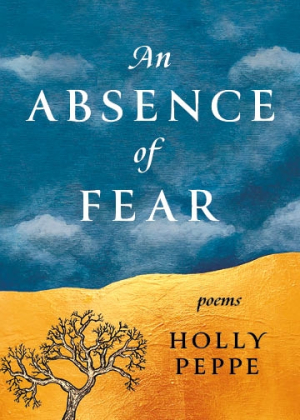An Absence of Fear
A lyrical poetry collection, An Absence of Fear denies death’s finality even as it mourns great human losses.
Holly Peppe’s precise poetry collection An Absence of Fear confronts the emotions surrounding death, from astonishment to grief, with aplomb.
Its lines centered on managing the death of a loved one through the persistence of memory, this is a rich if not wide-ranging collection. In “Not That Distance Makes the Heart,” the mind “has fixed a place for you here— / still moving away from me, / saying goodbye.” Here, and in most of the grieving poems, comes a direct address to the surviving consciousness of the lost loved one through the use of “you.” Elegies for named public figures are included too; their lines insist on the permanence of art in the face of death. Those who say musician Thelonious Monk is dead are dismissed as simple “liars,” and poet Eugenio Montale, be assured, will return with “seeds / of the sturdy Magnolia, its unopened flowers / small walls of glory unwilling to fall.”
Still, while the deaths of a number of different people are mourned throughout, the less well-known the subjects are, the less accessible the poems become. Indeed, where the entries are intimate, few of those addressed as “you” are made distinctive; most of the losses are without shading and specificity, holding at a distance those beyond the mourner and the mourned.
Sonic resonance directs the book’s lines, which don’t rhyme but use sounds that chime together. Working in free verse aside from a single sonnet entry, the poems make room for the dances of repetition and expectation more often found in formal verse. Their imagery also stands out, layered together and pushed to precarious edges. The powerful, nine-line entry “On Rilke’s Dolls” moves from a neutral statement (“I was a shoemaker in Chicago”) to sentimentality (“I mended shoes, I mended dolls”) and cruelty (“I ripped off ears, I sewed on eyes”), headed toward a final, mutilating image of personal loss.
Despite the poems’ assertions that death is not as powerful as imagined, though, the book’s overall tone remains quite mournful, even bleak in places. In “Loving and Dying,” the speaker considers the “isolation of hard loving,” concluding, “In the end / no one / will forgive you.” And some images, in their precision, cut so deep that their lines even ache. The poem “In Borghese Park,” for example, concludes with “a wind that carries sadnesses / across the graves of birds.”
An Absence of Fear is a lyrical poetry collection that denies death’s finality even as it mourns great human losses.
Reviewed by
Michele Sharpe
Disclosure: This article is not an endorsement, but a review. The publisher of this book provided free copies of the book and paid a small fee to have their book reviewed by a professional reviewer. Foreword Reviews and Clarion Reviews make no guarantee that the publisher will receive a positive review. Foreword Magazine, Inc. is disclosing this in accordance with the Federal Trade Commission’s 16 CFR, Part 255.

